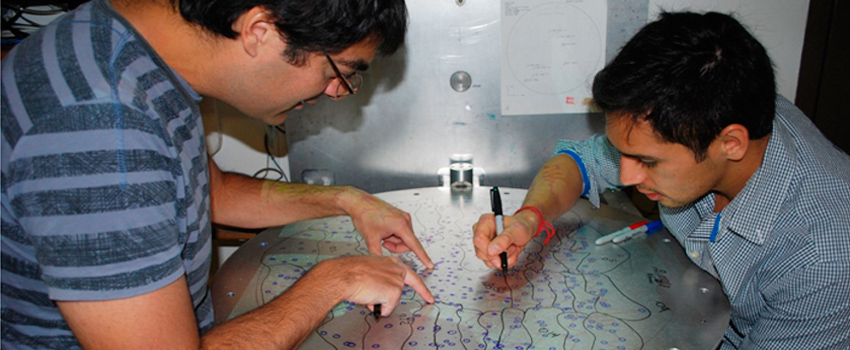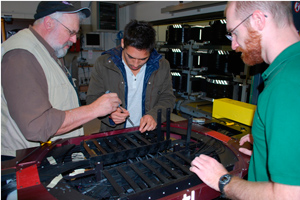- News
Mechanics academics carry out a scientific internship at the Apache Point Observatory in the United States

Engineers Daniel Garrido Cuadra and Mario Cáceres Cáceres, academics from the Department of Mechanical Engineering at the University of La Serena, carried out a scientific internship at the Apache Point Observatory (APO), in the state of New Mexico, United States, as part of their activities in the QUIMAL project of the ULS, financed by CONICYT.
The QUIMAL project is carried out by the universities of La Serena (project leader), Chile, Católica, Antofagasta and Andrés Bello, and its director is Dr. Alexandre Roman Lopes, from the Department of Physics of the U. of La Serena . The project has the support of the prominent institute for science, Carnegie, Washington, and with the collaboration of different North American universities that are members of the Astrophysical Research Consortium (ARC).
At the University of La Serena, the QUIMAL project is a multidisciplinary project that brings together mechanical, electronic engineers, physicists and astronomers and the departments of Physics and Mechanical Engineering actively participate in its implementation, through its directors, Doctors Pedro Vega and Ricardo Castillo , respectively. The objective of the QUIMAL project is to promote Chilean participation in the most ambitious astronomical project of recent decades, known as ''Sloan Digital Sky Survey'', which aims to study the local and distant universe in various spectral ranges (from optical to near infrared).
 The purpose of the trip was to learn about and delve into infrastructure, equipment, instrumentation and perspectives for improving designs related to the study of galaxies in the Southern Hemisphere, to obtain a better understanding of the numerous sub-systems that will be replicated and adapted to the APOGEE-S project, to be installed on the du Pont telescope, located at the Las Campanas Observatory (LCO), Coquimbo Region, Chile. This initiative will be replicated in the Department of Mechanical Engineering through the creation of an Astro-Engineering Laboratory, to support the construction of instrumentation for astronomical research and training of astronomers in the use of interchangeable optical fiber cartridges for the APOGEE2 spectrograph , to be used in the project.
The purpose of the trip was to learn about and delve into infrastructure, equipment, instrumentation and perspectives for improving designs related to the study of galaxies in the Southern Hemisphere, to obtain a better understanding of the numerous sub-systems that will be replicated and adapted to the APOGEE-S project, to be installed on the du Pont telescope, located at the Las Campanas Observatory (LCO), Coquimbo Region, Chile. This initiative will be replicated in the Department of Mechanical Engineering through the creation of an Astro-Engineering Laboratory, to support the construction of instrumentation for astronomical research and training of astronomers in the use of interchangeable optical fiber cartridges for the APOGEE2 spectrograph , to be used in the project.
The University's engineers continue to contribute with the redesign of the fiber optic instrument for the du Pont telescope, introducing carbon fiber technology in their designs, obtaining multiple benefits.
